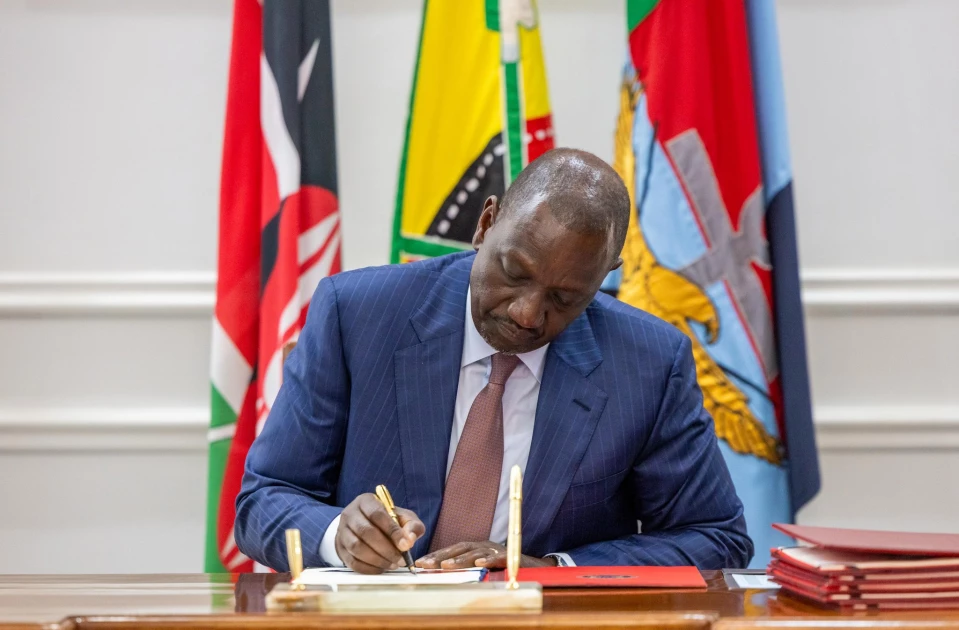President Ruto signs Conflict of Interest, Social Protection bills into law

President William Ruto assents to the Conflict of Interest Bill, 2023, and the Social Protection Bill, 2025, at State House in Nairobi on July 30, 2025. | PHOTO: PCS

Audio By Carbonatix
President William Ruto on Wednesday assented
to the Conflict of Interest Bill, 2023, and the Social Protection Bill, 2025,
at State House in Nairobi.
The former, sponsored by National Assembly
Majority Leader Kimani Ichung’wah, seeks
to tame conflict of interest in the public service by consolidating all
relevant provisions under a single law, while giving the Ethics and
Anti-Corruption Commission (EACC) full oversight authority.
The bill repeals the
existing Public Officer Ethics Act (Cap. 185B) and introduces stricter rules to
curb unethical conduct among public officers.
EACC will be the
principal agency charged with implementing and supervising compliance, in line
with its constitutional mandate under Article 79.
At its core, the bill seeks to ensure that public officers do not use their positions for personal gain or to give undue advantage to others. It prohibits them from granting preferential treatment beyond what is allowed by law or official policy, being influenced by offers of external employment when carrying out official duties, and engaging in business contracts with their government entities.
It also bars them from acquiring interests in companies that have contracts with their reporting institutions, and taking on outside employment that conflicts with or impairs their public service responsibilities.
Public
officers will be required to recuse themselves from decisions where they have a
personal interest, and must declare their income, assets, and liabilities,
including those of their spouses and dependent children.
The Social Protection Bill, 2025, meanwhile, seeks to establish a more inclusive, rights-based and
life-long safety net for vulnerable citizens.
The bill, also sponsored
by Ichung’wah, creates a non-contributory social protection framework, meaning
beneficiaries would receive support without having to pay.
It proposes a life-cycle
approach where social protection is tailored to different stages of an
individual's development, from childhood through old age.
The bill establishes a
National Board for Social Protection, which will be chaired by a presidential
appointee and include representatives from key government departments,
counties, and civil society.
The board will be
tasked with designing, coordinating, and monitoring national social protection
programmes, including cash transfers, psychosocial care, feeding programmes,
and the provision of assistive devices.
Counties will also be
mandated to implement national policies through localised laws and strategies.
They will be required
to allocate resources, maintain registries of vulnerable populations, and
coordinate interventions with the national government.
The bill outlines who qualifies as a person in need: orphans and vulnerable children, persons with disabilities, older people living in poverty, those affected by disasters, and unpaid or unsupported caregivers.
However, the Cabinet
Secretary for Social Protection has the power to expand the list to include
other needy groups.
Individuals can apply
for benefits through a registration process, which includes an assessment by
the social protection board. If one is denied support, they can request a review by the board and
appeal to the CS or the High Court within 30 days.
A Social Protection Fund, managed by the National Treasury, will be created to finance the programme.
"The new law not only closes the loopholes corrupt officials have been exploiting to steal money from public coffers, it also makes it much more difficult for them to use proxies to advance corruption. The Ethics and Anti-Corruption Commission (EACC) now has the levers to advance the fight against graft, abuse of power and the manipulation of public trust for private gain," he said.



Leave a Comment